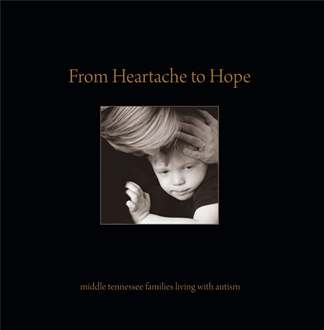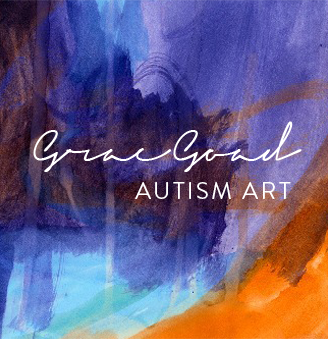It was a familiar scenario. One that happens frequently. I'm preoccupied selecting groceries or on some errand for which I've brought along Grace, my perpetual sidekick. From behind me:
"Hi, Grace!"
I turn around to see the usually youthful smiling face. Someone excited to see my daughter. The backstory is usually that the person is a Vanderbilt student or a volunteer–someone who has interacted with my daughter in some capacity somewhere–at my daughter's school, in a social outing, some special event. We exchange pleasantries and I am always deeply grateful for their taking time to engage my daughter with autism and to say hello to her.
The other night's meet up started off that way, too. I turn and this time it's a volunteer. Someone more my age. In fact we'd met but in another capacity–not knowing how our lives intersected on another level. I am impressed with his volunteer efforts. We begin to talk about autism. Then he says:
"One of my sons has autism, bet you can't guess which one," he joked. Deftly as any autism parent, I spotted the hyperactive son.
"He's high functioning but is on the road to recovery," said his Dad.
Alright. I know about the one percent of the autism spectrum that claims recovery. Yale is doing the studies. The one percent occurs among children diagnosed with what often manifests as a milder form of autism–PDD-NOS (that's alphabet soup for Pervasive Developmental Delay-Not Otherwise Specified….Further interpretation: the person meets almost all the criteria within three categories–speech, behavior and social functioning–for a full blown diagnosis of autism, but not quite. But it's still considered autism.) If the member of this one percent of the autism population receives their diagnosis before the age of two–the earlier the better–and rigorous early intervention is applied, such as behavior analysis and, at least anecdotally, biomedical treatments—supplements and diet, especially the removal of casein and gluten–the proteins of dairy and certain grains, respectively–then that one percent can lose their diagnosis. One. Percent. But studies have also shown that those same children still bear the diagnoses of speech/language issues and/or learning disAbilities. Children with PDD-NOS were the ones for which controversial behaviorist Ivar Louvass took credit for "curing" their autism. What his work really showed is that it's possible to "extinguish" the symptoms of autism.And, as many of us know in the community, what’s extinguished is eventually is replaced because behaviors are rarely random. They serve a purpose.
I digress….
Up one aisle. Down the next. Past the cereals. Grabbing a jar of peanut butter. A can of tuna…the father and I continued about our errands meeting up every aisle or so until one last meeting before I left the store.
"Here." I handed him my card with the caveat: "I'm not one who believes autism is bad….And this," I said, pointing to the web address on the back of our card and my daughter's art website address, "is some of what can be done on the severe end of the autism spectrum."
I wasn't rude. I simply spoke my truth and waved goodbye.
And then, heading home, I phoned my autism mom friend, Dena Gassner:
"Why does that 'get my goat?!'" I vented with vigor, recanting the details of my conversation wtih the father.
Always ready with an articulate response, not missing a beat, she retorted:
"We have got to stop crippling ourselves with labels of high and low functioning."
She relayed a story about recently spending time with a friend who read her chapter in a recently released book: Scholars with Autism Achieving Dreams. In less than 10 minutes her friend read an inordinate number of pages, comprehended and resonated with her complex life experiences with autism and was able to catch an inadvertent complex punctuation snafu.
"This from a man diagnosed as 'severe and profoundly disabled' as a child! He now has multiple advanced post graduate degrees! When we brand our individuals on the spectrum, we penalize them with our words and ignore the potential that they gift us via their label of autism. They have these gifts because of their disAbility."
Yes. Yes. Exactly.
Photo: This summer I found a hobby I can do anywhere my phone: transform pictures I've taken on my Droid with photo apps. The photo above is one example and I'll be sharing more my spring and summer travel series "Friday Forays" starting soon. I snapped this picture above in my dining room. Grace has always been an organizer and her jobs at school and in summers lean toward using those gifts. Here…she even organized her cherries by color groups. Love it!





I fear that as a new parent in the the Autism world, I have been guilty of analyzing the diagnosis and the labels to an extreme. I’m still finding my place. My child is who he is, no matter labels doctors, therapists, teachers, or even I apply to him. It is a journey though, and I’m trying to learn as much as I can. Thanks for sharing.
Great article, Leisa! Thank you! And thanks so much for the book reference, Scholars with Autism Achieving Dreams.
I agree with the crippling effect of labeling, but the medical and educational field will cling to the necessity. It will take you and others, Grace’s life and the lives of individuals achieving dreams to really give the labeling the kick it deserves.
I realize now I should have placed the word “necessity” in quotation marks in my first comment. Thanks!